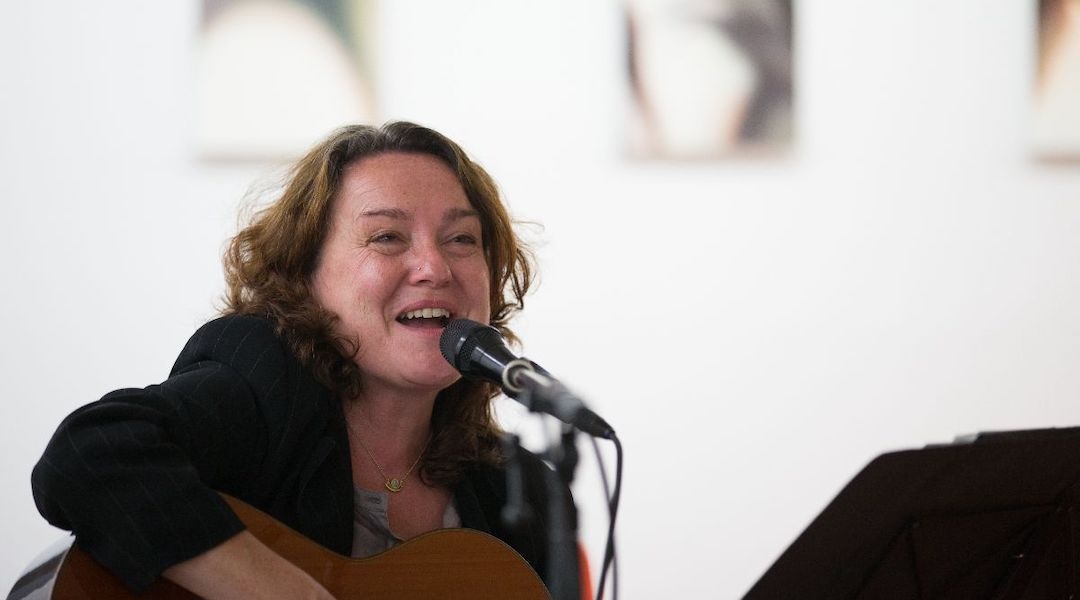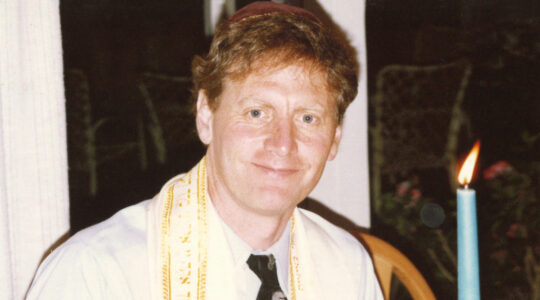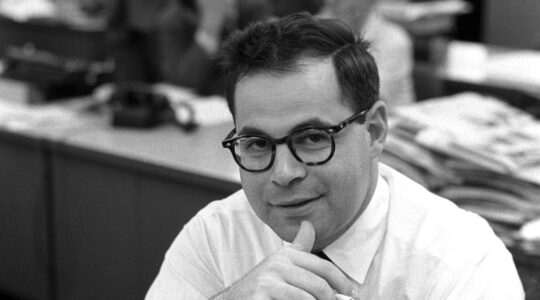(JTA) — Andrea Pancur, a Munich-based singer, teacher and activist who helped bridge the worlds of German and Yiddish song culture — and who served as role model for women in the world of klezmer music — died last week at her home. She was 54.
Her unexpected death due to what a friend said was a brain aneurysm drew an outpouring of grief from the tight-knit world of klezmer musicians, many of whom collaborated with her on recordings and music festivals throughout Europe and North America.
“Impossible to believe this — a huge loss of someone who was such a living, alive part of the Yiddish music community, and a friend I was really happy to reconnect with,” Abigail Wood, author of a book on contemporary Yiddish song, wrote on Facebook.
Although raised Catholic, Pancur (pronounced PAN-chur) felt an affinity with the Yiddish musical culture that thrived for centuries across Europe before its devastation by the Holocaust. In 2014 she won the main prize from the TFF Rudolstadt music festival for her “Alpen Klezmer” project, a fusion of Yiddish and Bavarian musical traditions. She and her collaborator, Ilya Shneyveys, explored the linguistic and musical motifs shared by the two traditions, finding points of connection between cultures that seemed irreconcilable after the genocide.
On the song “Rhaynlender,” for example, Pancur — accompanied by Lorin Sklamberg, the frontman of the Klezmatics — combined a Jewish polka lyric with a Bavarian folk melody.
Der Neue Tag, a German daily, once called her “the most important representative of Yiddish culture in Germany.”
Alan Bern, founding artistic director of Yiddish Summer Weimar, suggested that growing up with Slovenian roots in southern Germany spurred Pancur’s interest in what he called “transculturalism.”
“Yiddish culture is the transcultural culture of Europe,” said Bern. “If you go in one door in Yiddish culture, you see hundreds of doors that connect to every other culture in Europe. As a result, Yiddish connects to a community of those who are themselves cultural identity seekers.”
Yiddish Summer Weimar, an annual festival of concerts and classes in the German city, is a pilgrimage site for such seekers. Pancur, a student of Bern’s, and Shneyveys, a Latvian-born musician now living in Brooklyn, met in 2011 at Weimar, which at the time was focusing on Jewish culture in German lands known historically as Ashkenaz.
Pancur had been singing in Yiddish for 25 years at that point, having been inspired in the mid-1980s by a recording by Chava Alberstein, the Polish-Israeli singer. But, as she explained in a video, “I also felt that something was missing. I felt that I would like to express myself in my own folk music tradition.”
She and Shneyveys went on to collaborate on three albums, including two “Alpen Klezmer” recordings, and numerous concerts.
“She was a really charismatic performer, activist, a great singer and a great interpreter of Yiddish music,” said Shneyveys.
Until 2017, Pancur served on the board of Other Music E.V., the nonprofit behind Yiddish Summer Weimar. She also organized the biennial Kunstdünger klezmer festival in Munich. Since January 2018 she had been the artistic manager of Musik.vor.Ort, a project that brings musicians from Munich to play with and for clients of a local food bank.
Pancur’s concert tours and teaching took her to Austria, Belgium, Bulgaria, France, Great Britain, Liechtenstein, the Netherlands, Israel, Italy, Switzerland and the United States. Shneyveys said his first visit to New York was on a concert tour that included a stop in the city.
Pancur toured with her own modern klezmer quartet and as a guest with the trio A Tickle in the Heart. Her solo program, “Federmenth,” featured Yiddish music after 1945. On her 2019 album “Weihnukka,” she combined music from a Bavarian Christmas with Hanukkah melodies.
In July 2022, she performed in and wrote the music for a play, “The Troglauer: Robber, Horse Thief, Revolutionary,” at the Vilseck Castle Festival in Bavaria. She collaborated with the Ukrainian-born DJ Yuriy Gurzhy on “Pumpkin Machine,” a project combining folk music and electronic dance music.
In addition to her music, Pancur was active in social justice, gender equality and refugee resettlement projects. According to Bern, she led a community choir for low-income people. During the pandemic, she offered group singing lessons over the phone, connecting people unable to leave their homes.
Pancur was also a strong advocate for women’s recognition in music. With “Alpen Klezmer,” Bern noted, she was a leader of a project that otherwise featured mostly men. She also managed her own career and founded her own music label. In 2020 she organized the first International Network Meeting for Women and Non-binary People in Yiddish Culture in Nuremberg.
In a 2013 interview with the Jüdische Allgemeine, Pancur said her goal in finding common cultural ground between German and Yiddish was not to erase the memory of the Holocaust but to “put the joy of life in the foreground and avoid dismaying music…. No one is just a victim.”
Pancur’s website explained that German and Yiddish folk music feature “songs that are so old that even the ancient Bavarian and the old Klezmer musicians back in the day had no idea they were both playing the same thing.”
Pancur imagined both peoples dancing together, “spinning around up to the summit until the Alps are glowing with the sounds of Klezmer.”
Pancur was divorced. Information about survivors was not immediately available.
JTA has documented Jewish history in real-time for over a century. Keep our journalism strong by joining us in supporting independent, award-winning reporting.






